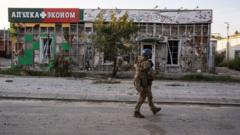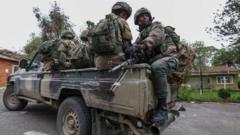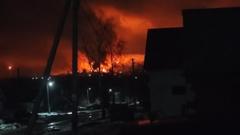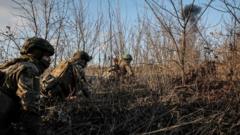Recent reports indicate that approximately 1,000 North Korean troops have been killed in the ongoing conflict in Ukraine's Kursk region, with total casualties reaching 40% among the 11,000 deployed soldiers. Experts raise concerns over the lack of training and preparation for these elite units as they face challenges on the battlefield.
North Korean Casualties Surge Amidst Kursk Conflict
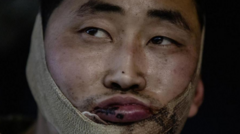
North Korean Casualties Surge Amidst Kursk Conflict
Nearly 40% of North Korean soldiers deployed to support Russia have been reported as casualties in a swift three-month campaign.
Reports from western officials reveal that around 1,000 North Korean soldiers have been killed in the intense fighting in Russia's Kursk region, where approximately 11,000 troops were sent to support the Kremlin's military objectives. Just three months into the engagement, authorities indicate that nearly 40% of North Korean forces—totaling about 4,000—have sustained casualties, which includes those slain, injured, missing, or taken prisoner.
The situation raises alarms regarding the North Korean military's sustainability given such heavy losses. Details surrounding the treatment of the wounded or any plans for replacements remain unclear, posing significant strategic implications for both North Korea and its ally, Russia. As President Vladimir Putin seeks to augment his military efforts against Ukraine, these statistics reflect a stark toll on Kim Jong Un’s forces as they endeavor to support Russian advances ahead of anticipated ceasefire discussions later this year.
In August, Ukraine executed a surprising incursion into Russia's Kursk oblast, catching Russian border guards off-guard. The Ukrainian government clarified its intentions, stating it aimed to use the captured territory as leverage in any future negotiations rather than retaining control. Nevertheless, while Ukrainian advancements in Kursk have faced setbacks, they continue to hold significant areas of Russian territory and inflict considerable losses on their adversaries.
The North Korean soldiers, primarily from an elite unit named the Storm Corps, are reportedly engaging in combat with minimal training and inadequate protection. Military analysts, including former British Army tank commander Col Hamish de Bretton-Gordon, highlight that these troops are at a severe disadvantage, being utilized almost as cannon fodder under Russian command that they cannot fully comprehend. The situation is alarming, with North Korean troops not yet acclimates to the realities of modern warfare, making them particularly vulnerable to Ukrainian strategies, including the use of advanced FPV drones.
Despite these challenges, Ukraine's top military commander, Gen Oleksandr Syrskyi, has acknowledged that the North Korean contingent poses notable operational difficulties. He described them as "numerous" reinforcements that operate with Soviet-style tactical discipline, working in organized units while relying heavily on sheer numbers. The ongoing situation in Kursk highlights the complexities and costs associated with bolstering battlefield forces in modern conflicts.




